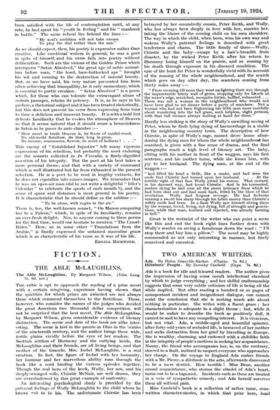FICTION:
THE ABLE McLAUGHLINS.
The Able McLaughlins. By Margaret Wilson. (John Long. 7s. 6d. net.)
THE critic is apt to approach the reading of a prize novel with a certain misgiving, experience having shown that the qualities /or which prizeS are awarded are not always those which commend themselves to the fastidious. Those, however, who consider the names of the judges who decided the great American two thonsand dollar competition will not be surprised that the best novel, The Able McLaughlins, by Margaret Wilson, gives considerable evidence of literary distinction. The scene and date of the book are alike inter- esting. The scene is, laid in the prairie.-in Ohio in the 'sixties of the nineteenth century, and the authOr brings these wide, fertile plains vividly before the eyes Of her readers. The Scottish settlers of Harmony •and the outlying lands, the McLaughlins and their friends, are all living beings, and that mother of the Gracchi, Mrs. Isobel McLaughlin, is a real creation. In fact, the figure of Isobel with her humanity, her Minion? and her Marvellous ability runs through the book like a cord binding the various episodes together.. Though the, real hero of the book, Wully, her son, and his deeply-wronged wife, Chirstie McNair, are well drawn, they are overshadowed by this great example of maternity. An interesting psychologicia study is provided by the paternal feelings of Wully McLaughlin to the child whom he knows rot to be his. The unfortunate Chirstie has been betrayed by her scoundrelly ;cousin, peter. Keith, and Wully, who . has always been deeply in love with; her, marries her, taking the blame of the coming child on his own shoulders. The way in which the child, when born, wins his own way and
wakens Wully's paternal feelings is described with great tenderness and charm. The little family of three—Wully, Chirstie and the baby—escape by a hair's-breadth from disaster, by the wicked Peter Keith after his return to Harmony losing himself on the prairie, and so coming by his death through exposure in his diseased condition. The epic of the hunt for Peter is wonderfully vivid with its account of the rousing. of the whole neighbourhood, and the search
which goes on day after day, the searchers coming from thirty miles away :— " From morning till noon they went op fighting their way through the impenetrable briery wall of green, stopping only for L;Path at the water's edge, scratched, mosquito-bitten, baffled, exhausted..... There was not a' woman in' the neighbourhood who • would not have been glad to set dinner before a party of searchers.- Not a woman who had not been frightening her little ones more carefully about wandering into the tall grass, such helpless, slight persons, with that tall menace always waiting at hand for them."
Hardly less striking is the story of Wally's unwilling saving of Peter, whom he finds lying dying of haemorrhage in a stable in the neighbouring country town. The description of how Chirstie, in spite of Wally's rage, cannot drive home aban- doning the dying man for whom the whole neighbourhood lais searched, is given with a fine sense of drama, and the final
paragraphs reach a high level of literary art.. The baby, sitting with his Mother in frOnt of the waggon, says his first
sentence, and his mother turns, while she kisses him, with joy to her husband. The dying man, at the end of the waggon :— " had lifted his head a little, like a snake, and had seen the smile that Chirstie had turned upon her husband. . . At the terrible sight of that face Wully pitied his enemy. That coward, in his damned way, had -loved Chirstie. And' in. his tormented, sunken dying he had seen all the sweet intimacy from which he had been shut out and had sunk back, felled by the blow of that revelation. Wully had forgone revenge. Ile had forborne running a sword less sharp through his fallen enemy than Chirstie's wifely smile had been. In a flash Wully saw, himself sitting there by the woman, loved, living, not dying, full of strength and genera- tions, while that man, loathed and rejected, was already burning in hell." .
Great is the restraint of the writer who can paint a scene
like this and end the book eight lines further down with Wully's resolve on seeing a farmhouse down the road : " I'll
stop there and buy him a pillow." The novel may be highly commended as not only interesting in manner, but finely conceived and executed.










































 Previous page
Previous page